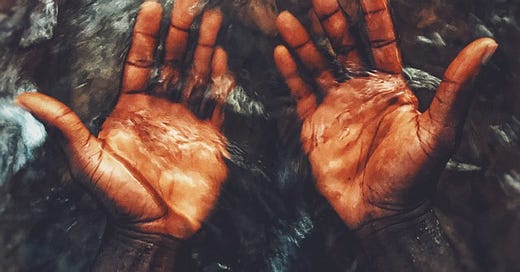When Life Becomes About Letting Go
“The paradox is that much of what we think is work at life — all the ways in which we try to bend reality to our will, all the ways in which we clutch at control (which only ever means the illusion of control) as an organizing principle — is in fact an escape from the true work, which is the work of letting go: letting go of the illusion, of the systems of belief and magical thinking by which we fancy ourselves in control.”
Maria Popova, The Marginalian
This opening stanza is from a moving piece entitled Control For Surrender: Henley Miller’s Stunning Letter to Anaïs Nin About the Value of and the Antidote to Despair. It recently appeared in “The Marginalian,” a publication written and curated by Maria Popova, a woman who has been the primary inspiration behind my own “Great Books, Great Minds” publication. She continues:
“The subtlety — sometimes devastating, sometimes deeply rewarding — lies in learning the difference between the false work and the true work of life: that elusive art of active surrender.”
In recent weeks I’ve been feeling a bit discouraged at the lack of growth in my new paid member supporters for “Great Books, Great Minds.” As a result, the “ego gremlin” in my head has been working overtime, unleashing a flurry of deflating banter about my current income flow predicament. Shouldn’t you begin “grinding and pushing before you fall into a dark abyss,” the voice insists. “Or better still, get a job in the frozen slurpee section at one of the 7-11 convenience stores.”
In recent days, I was reminded of how whenever I let go, doing “little or nothing” to try to force things towards the outcome I‘m demanding, things effortlessly unfold. This is the essence of what Taoists refer to as “Wu Wei,” a word that’s commonly defined as “do nothing accomplish everything.” Or my favorite interpretation:
“Effortless Action.”
Let me clarify that this does not mean embracing life as a slothful flaneur who ceases all action in the hopes that the results will naturally appear. Rather, we who have deeply embraced the “Taoist Way” recognize that by not aggressively interfering with the natural rhythm of life, we allow the natural flow of life’s perfect order to unfold.
In the book “Living In The Tao: The Effortless Path of Self Discovery,” author Mantak Chia notes:
“Because when you are doing nothing, you do not obstruct the natural flow of the Tao, the flow of that river, and the flow of the universe. —- Because left to my own devices, I have a tendency to oversteer, overcorrect, and overdrive my headlights, making things far worse than they were.”
And in an example about the workings of trees in nature, he adds:
“What happens when you keep digging up the tree? It never grows. The same is true with the Taoist practice: if you keep forcing it, it will never grow. Just do a little practice each day and let it grow.”
Chia says that human nature is naturally conditioned for instant gratification. For me, that means “when is the frigin money going to appear in my account?” Or “why is it that despite all of my tweeting don’t I have more followers on Twitter.”
The outside pressures to “grind until your manifest” that’s so ingrained in our Western (Protestant Ethic) ethos can be so exhausting. In my experience, “what you chase is what flees.”
Just saying.
Says Chia
“The only choice you really have is how you enjoy the ride. You either learn to flow with the river, which can be quite effortless, or you can swim against it, causing suffering.”
Let me close with a brief excerpt from my all-time favorite book
Sacred Hoops: Spiritual Lessons of a Hardwood Warrior. The author, legendary NBA basketball coach Phil Jackson, adds:
“What pollutes the mind in the Buddhist view is our desire to get life to conform to our peculiar notion of how things should be, as opposed to how they really are. In the course of everyday life, we spend the majority of our time immersed in self-centered thoughts. Why did this happen to me? What would make me feel better? If only I could make more money, win her heart, make my boss appreciate me. The thoughts themselves are not the problem; it’s our desperate clinging to them and our resistance to what’s actually happening that causes us so much anguish.”
The message here:




